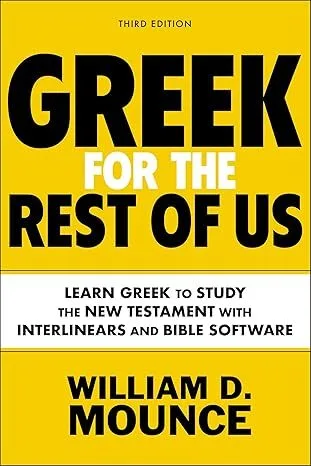Introduction
Understanding Greek words is essential in Biblical studies as it allows for a richer interpretation of Scripture by revealing the nuances embedded in the original language. The Greek word ἔρχομαι (erchomai) is particularly significant as it is a common verb used throughout the New Testament to mean “to come” or “to go.” It is foundational to understanding key theological themes such as the coming of Jesus, the arrival of the Kingdom of God, and various actions associated with divine intervention and human response in ancient Greek culture and the Bible.

Key Information
ἔρχομαι

Strong’s Entry
g2064
Key Information
- The Greek Word: ἔρχομαι (erchomai) [ER-kho-my]
- Etymology: Likely derived from a Proto-Indo-European root ergh- meaning “to move” or “to go.”
- Part of Speech: Verb; middle voice, deponent.
- The F.O.G Word Choice: Coming Soon.
Primary Meanings
- To come: Refers to someone arriving at a place.
- To go: Indicates movement from one place to another.
- To appear: Used in contexts where someone or something appears or comes into sight.
- To enter: Implies entering a place or a state.
- To happen: Can mean “to occur” or “to take place.”
Similar Words: πορεύομαι (poreúomai) [po-REY-o-my] also means “to go” or “to travel,” but it often emphasizes a journey or traveling with purpose, while ἔρχομαι (erchomai) is more about the act of coming or going itself, often without the specific journey context.
Further Insights: ἔρχομαι (erchomai) is a deponent verb in Greek, which means it appears in the middle voice but functions actively in meaning. The verb is irregular and has different forms across tenses. Below is a table showing some principal parts of ἔρχομαι:
| Tense | Form | Meaning |
|---|---|---|
| Present | ἔρχομαι | I come/go |
| Future | ἐλεύσομαι | I will come/go |
| Aorist | ἦλθον | I came/went |
| Perfect | ἐλήλυθα | I have come |
| Imperfect | ἤρχομην | I was coming |
Click here for a beginner’s guide to reading Greek.
Lexicon Insights
BDAG: ἔρχομαι is defined broadly as “to come” or “to go.” BDAG highlights its usage in various contexts, from simple physical movement to more abstract senses such as “to arrive” at a spiritual state or understanding. It also discusses its theological implications when used in the context of Christ’s coming.
Thayer’s: Lists ἔρχομαι as “to come, to go, to arrive,” and emphasizes its importance in New Testament writings, where it often denotes the coming of Christ, divine encounters, and eschatological events. Thayer provides numerous scriptural examples illustrating its use in both literal and metaphorical senses.
Vine’s Expository Dictionary: Focuses on ἔρχομαι as meaning “to come” or “to go.” It discusses the word’s flexibility and its usage in prophetic texts, particularly in the Gospels and Revelation, where it often implies a future arrival or return.
LSJ (Liddell-Scott-Jones): Lists ἔρχομαι as “to come” or “to go,” with extensive examples from classical Greek literature that show its use in everyday speech and literary works, reflecting both physical and metaphorical movements.
Strong’s Exhaustive Concordance: Defines ἔρχομαι as “to come” or “to go,” and it is listed as a common verb with multiple forms. Strong’s highlights its frequent appearance in the New Testament, especially in contexts that discuss Jesus’s ministry, the coming of the Holy Spirit, and eschatological themes.
Related Scripture References
- Matthew 24:30: “Then will appear in heaven the sign of the Son of Man, and then all the tribes of the earth will mourn, and they will see the Son of Man coming [ἔρχεται] on the clouds of heaven with power and great glory.”
- John 14:3: “And if I go and prepare a place for you, I will come [ἔρχομαι] again and will take you to myself, that where I am you may be also.”
- Revelation 22:12: “Behold, I am coming [ἔρχομαι] soon, bringing my recompense with me, to repay each one for what he has done.”
Classical Usage
| Author | Name of Work | English text |
|---|---|---|
| Homer | Odyssey | “When the moment came (ἔρχεται) for him to return, all celebrated his safe journey home.” |
| Plato | Republic | “Justice will come (ἔρχεται) to those who seek it diligently in their souls.” |
| Herodotus | Histories | “The soldiers prepared for what was to come (ἔρχεται), knowing the enemy approached swiftly.” |
Septuagint Examples:
| Author | Name of Work | English text |
|---|---|---|
| Genesis | Book of Genesis | “And he came (ἔρχεται) near and kissed him; and Isaac smelled the smell of his raiment.” |
| Exodus | Book of Exodus | “And when the Lord comes (ἔρχεται) down to the mountain, the people shall not touch its base.” |
| Isaiah | Book of Isaiah | “Behold, your king comes (ἔρχεται) to you; he is righteous and having salvation.” |
Summary of ἔρχομαι (G2064)
In summary, ἔρχομαι (erchomai) is a versatile Greek verb meaning “to come” or “to go.” It appears frequently in the New Testament, conveying both literal movements and significant theological concepts such as the coming of Christ or divine intervention. The word is also prevalent in classical Greek literature, where it is used to describe a range of movements from physical journeys to abstract ideas of arrival or appearance. Understanding ἔρχομαι provides crucial insights into the narrative and theological frameworks of both biblical and classical texts.
Did You Know?
Did you know that ἔρχομαι (erchomai) is one of the most frequently used verbs in the New Testament? Its use is particularly prominent in the Gospels and Revelation, where it emphasizes themes of expectation, fulfillment, and divine presence, playing a key role in conveying the message of the coming Kingdom of God.
Note: While this entry strives for accuracy, readers engaged in critical research should verify citations and keyword occurrences in their Bible translation of choice. For Biblical citations, the F.O.G Bible project recommends Logos Bible software.
Strong's g2064




